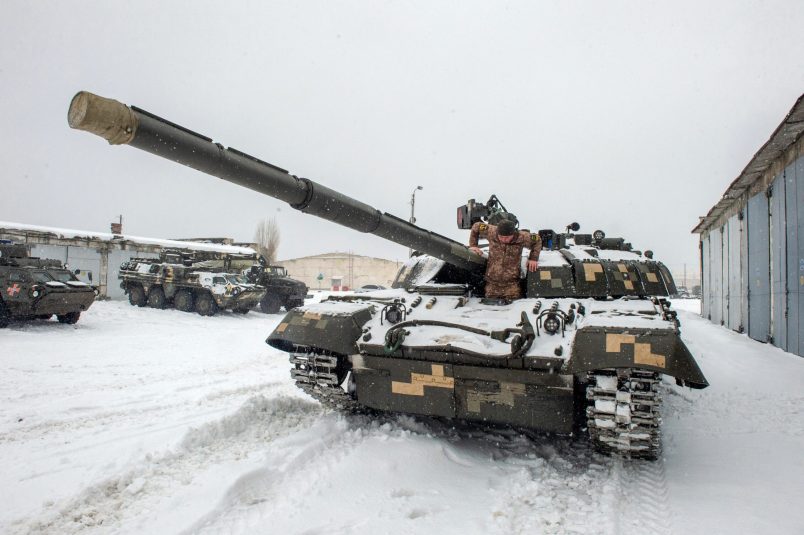As Russian troops advance on key Ukrainian cities, Kyiv’s Western allies are debating: how can we help?
It’s a conversation that is fraught with the risk of escalation, a threat that Russian President Vladimir Putin seemed to acknowledge directly in his Thursday morning declaration of war.
“Whoever tries to hinder us, and even more so, to create threats to our country, to our people, should know that Russia’s response will be immediate,” Putin said. “And it will lead you to such consequences that you have never encountered in your history.”
As battles raged in Ukraine on Thursday, officials in Kyiv demanded Western military assistance. The extent to which their pleas have been met remains unclear.
For Ukrainians, the reaction of Western powers is crucial to their defense.
“Everything will depend on the reaction of the West,” Volodymyr Fesenko, a Kyiv-based political analyst, told TPM in the days before the invasion.
The biggest ask from the Ukrainian government was for a no-fly zone over the country — a request that Western nations have denied. But Ukraine’s Foreign Minister Dmytro Kuleba said on Thursday that he agreed with both American and Polish government representatives that the two NATO states will continue to supply arms to Ukraine.
The U.S. and Poland have not yet confirmed Kuleba’s announcement.
But it comes amid a debate in the Biden administration over whether to arm a potential Ukrainian resistance, should Russia take control of the country. Part of the concern, Foreign Policy reported, is that Russia may come to see the U.S. as a “co-combatant,” a step that could bring NATO into closer conflict with Russia.
NATO Secretary General Jens Stoltenberg said this week that the situation was “the most dangerous moment in European security for a generation.”
Weapons transfers to remaining Ukrainian forces or insurgents could present a flashpoint for conflict between NATO and Russia, Ulrich Kuhn, director of the arms control and emerging technologies program at the Institute for Peace Research and Security Policy, Hamburg, wrote in the Bulletin of Atomic Scientists.
“How will weapons be transferred to Ukraine, now that Russia has established air dominance over the country?” Kuhn wrote. “They would almost certainly not be flown in but would have to be provided using land or sea routes.”
That being said, NATO itself would not prevent individual states like Poland or the U.S. from supplying weapons to Ukrainian insurgents. Only the countries of manufacture could issue a veto on export — Israel, which blocked the export of its Iron Dome system, is one example.
“There’s nothing in NATO stopping them from doing it,” Jeffrey Edmonds, a former Russia chief at the National Security Council, told TPM.
Kuhn and others have pointed out that the simple fact of Russian presence near NATO allies could increase the chances of collision. In 2015, for example, Turkish air defense systems brought down a Russian fighter pilot that, Turkey said, strayed out of Syrian airspace.
That marked the first time in decades that a NATO member state shot down a Russian aircraft.
Overall, the escalation risks come as much from the fact that the new war — the first of its kind in decades — is a venture into unknown than from anything else.
Edmonds, the former NSC official now at CNA, recalled serving in Iraq and Afghanistan.
“I’ve served in two of these wars, I see how shitty it can get really quick,” Edmonds added.







“This will get out of control. This will get out of control and we’ll be lucky to survive”
Admiral Painter
“Red October”
A fun statement from the Kremlin:
http://en.kremlin.ru/supplement/5770
Taiwan is next.
ED: Apparently the link is no longer working.
But they did survive in Red October.
well now… how about, fuck putin, and fuck russia, if they are that hot for starting a war with NATO, it’s This chamberlaining crap needs to stop.
about worth the toilet paper its printed on.